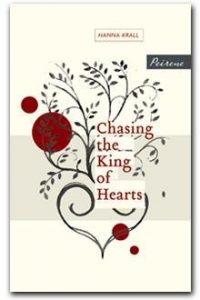What exactly about the bag is Jewish?
 Chasing the King of Hearts
Chasing the King of Hearts
by Hanna Krall
translated from Polish by Philip Boehm
This is my Poland choice for the EU Reading Challenge, one of several I bought from Peirene Press. It’s a true story from World War Two, retold by a journalist who herself survived the war by hiding in a cupboard. Which sounds like quite a story itself, but possibly not one as eventful as that of Izolda.
Izolda Regensberg is a Jewish woman whose history took her from the ghetto in Warsaw, to working for the Underground, to various workcamps and even Auschwitz. But we know early on this book that she survived, thanks to interspersed chapters about her attempts to communicate with her Israeli grandchildren.
Language is key to this amazing story. Language and love. Izolda speaks Polish, Yiddish, Russian and French, and during the war learns German, which helps her to fake her identity, make friends and make money. But in her old age she can’t speak even a sentence of Hebrew and can only communicate with her granddaughters through her own children. It’s an interesting comment on the reduced capacity for new language as we get older, even in people who are polyglots.
“It’s secret school in the kitchen, today’s subject is Polish history…Lilusia breaks off the lesson: Maria, take that handbag off the table, you can’t go tossing your bag around like some Jew girl. Izolda quickly picks up her handbag, excuses herself and laughs out loud with the others. The guests take their leave, and Lilusia explains that she was being crafty, that her remark was meant to clear any suspicions…Izolda understands Lilusia’s cunning, but then she takes a closer look at the handbag and sets it on the floor. How’s that? Does the bag look Jewish there? She tries the sofa, the stool, the chair…what exactly about the bag is Jewish?”
Although it seems that her language skills are what allows Izolda’s survival, what she credits her survival to is her love for her husband Shayek. She does help people escape through the Underground, but she does that to make money to send parcels to Shayek. She makes friends who she does favours for, but she calls in those favours in return either to aid her own escape or to make money. I quite liked how straightforward Izolda was about this (via Krall) – she’s not casting herself as a heroine, she’s telling her love story.
Some of the details are upsetting, which in the parts of the story set in wartime is hardly surprising. What I didn’t expect was the continued sadness of the story post-war. After all the energy Izolda expends on her focused mission to reunite with her husband, all the hustling and humiliation, life can never be everything she had been hoping for to get through that time. This is the part of the story that’s rarely told and I can understand why.
“Her husband’s parents spend all day sitting on the floor; they crawl to the bathroom. The honest widow doesn’t allow them to walk around the apartment, and she’s right: someone in the building opposite could look through the window and see everything. His parents have terrible looks and a terrible accent. They need to be well hidden and the greater the risk, the more you have to pay.”
This book is a more enjoyable read than its subject matter would suggest, which is a credit to Krall and her translator. And to Peirene Press.
Król kier znów na wylocie published 2006 by Świat Książki.
This translation published 2013 by Peirene Press.
Source: Bought direct from the publisher.